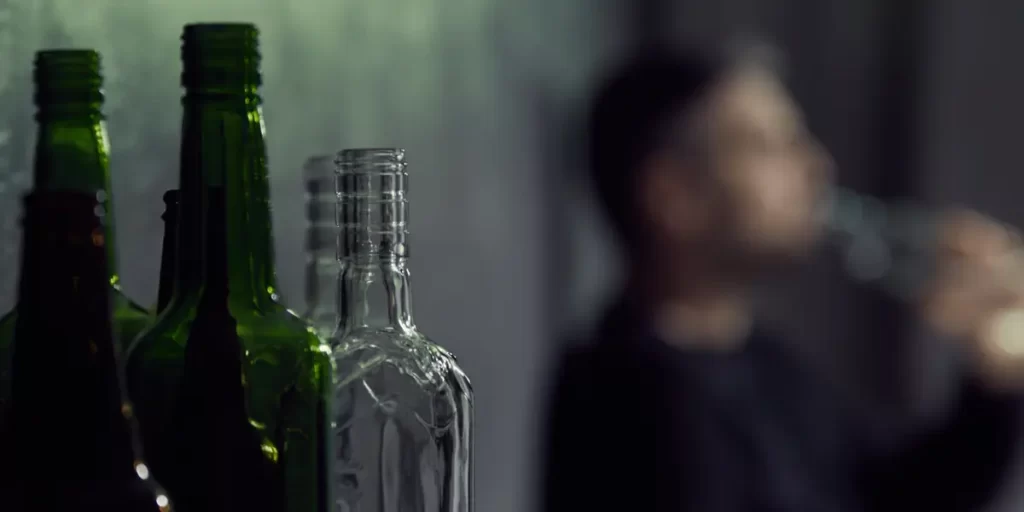What is Alcohol-Induced Psychosis?
Written by Thomas Christiansen
& Medically Reviewed by Dr. Trisha Sippel, PhD
Medically Reviewed
Up to Date
Last Updated - 6/17/2022
View our editorial policy
Alcohol-induced psychosis is a rare but dangerous side effect of alcohol misuse. The symptoms of alcohol-induced psychosis include hallucinations or delusions that are associated with drinking alcohol in a person with no prior history of a psychotic disorder. Alcohol psychosis symptoms should diminish when the person stops drinking and the alcohol leaves their system. These symptoms will often occur during withdrawal from alcohol use.
Types of Alcohol-Induced Psychosis
There are several different types of alcohol-induced psychosis, including acute alcohol intoxication, alcoholic hallucinosis and delirium tremens. Each type has its own unique set of symptoms, but all are brought on by heavy drinking. If a person experiences any of those conditions, they should speak with a medical professional.
Acute Alcohol Intoxication
Acute alcohol intoxication occurs when someone drinks a large amount of alcohol and experiences psychosis. This effect is unusual because alcohol-induced psychosis will normally occur only after extended alcohol use. When psychosis happens from a single binge-drinking event, it can be a sign of alcohol poisoning. Anyone experiencing the symptoms of acute intoxication should seek medical help immediately. Alcohol poisoning can be deadly.
Acute alcohol intoxication can involve symptoms, other than psychosis, that increase in severity as the concentration of alcohol in a person’s blood, also known as blood alcohol concentration (BAC), increases. When a person’s BAC reaches dangerous levels, they can experience amnesia, nausea, vomiting, problems with their vision, trouble breathing or coma.
Insurance May Cover the Cost of Rehab
Cost should not stop you from getting the help you need. See if your insurance is accepted at The Recovery Village.
Alcoholic Hallucinosis
Alcoholic hallucinosis is another name for experiencing alcohol-induced psychosis with prolonged alcohol use. Alcoholic hallucinosis can occur during heavy alcohol consumption or in the time following heavy alcohol use. It is characterized by a person having hallucinations, usually in the form of hearing voices in their head or experiencing delusions and disturbances in their mood, such as becoming irritable or aggressive. These symptoms may resemble schizophrenia.
Alcoholic hallucinosis is rare, occurring in only 0.6% to 0.7% of people who have an alcohol use disorder. While the hallucinations usually happen during or right after alcohol use, they can also occur later on, even after a person has abstained from alcohol use for some time.
Delirium Tremens
Delirium tremens is a condition that occurs during alcohol withdrawal. The condition happens when a person who has been using alcohol in large amounts for an extended period suddenly stops drinking alcohol. The symptoms usually begin within 48 hours after quitting alcohol use and can last for up to five days. During delirium tremens, a person may become confused, experience changes in mood or behavior and experience seizures, tremors, fever, sweating, high blood pressure, fast heart rate or hallucinations associated with alcohol withdrawal.
Delirium tremens can be serious and even lead to death. If someone experiences these symptoms associated with alcohol withdrawal, they should get medical assistance immediately.
Alcohol-Induced Psychosis Treatment
Someone experiencing alcohol-induced psychosis is a sign that they may have an alcohol use disorder. This type of disorder can be serious. If addiction is present, the person should seek medical attention as soon as possible. The initial treatment of alcohol-induced psychosis will focus on getting the person the help they need to stabilize their mood and any complications happening along with the psychosis. Once the alcohol has left their system, it is recommended that they get long-term help to avoid using alcohol.
Many alcohol treatment centers in Washington offer treatment for alcohol-induced psychosis and alcohol use disorders. If you are looking for a drug and alcohol treatment center near Portland, Oregon, or in the Washington state area, the Recovery Village Ridgefield can help.
Contact The Recovery Village Ridgefield to speak with a representative about how professional addiction treatment can address a substance use disorder and any co-occurring mental health disorders. Take the first step toward a healthier future, call today.
Sources
Stankewicz, Holly A.; Salen, Philip. “Alcohol Related Psychosis.” StatPearls Publishing, December 23, 2018. Accessed September 5, 2019.
Vonghia, Luisa; Leggio, Lorenzo; Ferrulli, Anna; Bertini, Marco; Gasbarrini, Giovanni; Addolorato, Giovanni. “Acute alcohol intoxication.” European Journal of Internal Medicine, April 2, 2008. Accessed September 5, 2019.
Bhat, Pookala S.; Ryali, VSSR; Srivastava, Kalpana; Kumar, Shashi R.; Prakash, Jyoti; Singal, Ankit. “Alcoholic hallucinosis.” Industrial Psychiatry Journal, December 2012. Accessed September 5, 2019.
MedlinePlus. “Delirium Tremens.” January 10, 2019. Accessed September 5, 2019.
Rahman, Abdul; Paul, Manju. “Delirium Tremens (DT).” StatPearls Publishing, November 18, 2018. Accessed August 30, 2019.
View Sources
Stankewicz, Holly A.; Salen, Philip. “Alcohol Related Psychosis.” StatPearls Publishing, December 23, 2018. Accessed September 5, 2019.
Vonghia, Luisa; Leggio, Lorenzo; Ferrulli, Anna; Bertini, Marco; Gasbarrini, Giovanni; Addolorato, Giovanni. “Acute alcohol intoxication.” European Journal of Internal Medicine, April 2, 2008. Accessed September 5, 2019.
Bhat, Pookala S.; Ryali, VSSR; Srivastava, Kalpana; Kumar, Shashi R.; Prakash, Jyoti; Singal, Ankit. “Alcoholic hallucinosis.” Industrial Psychiatry Journal, December 2012. Accessed September 5, 2019.
MedlinePlus. “Delirium Tremens.” January 10, 2019. Accessed September 5, 2019.
Rahman, Abdul; Paul, Manju. “Delirium Tremens (DT).” StatPearls Publishing, November 18, 2018. Accessed August 30, 2019.
Authorship





